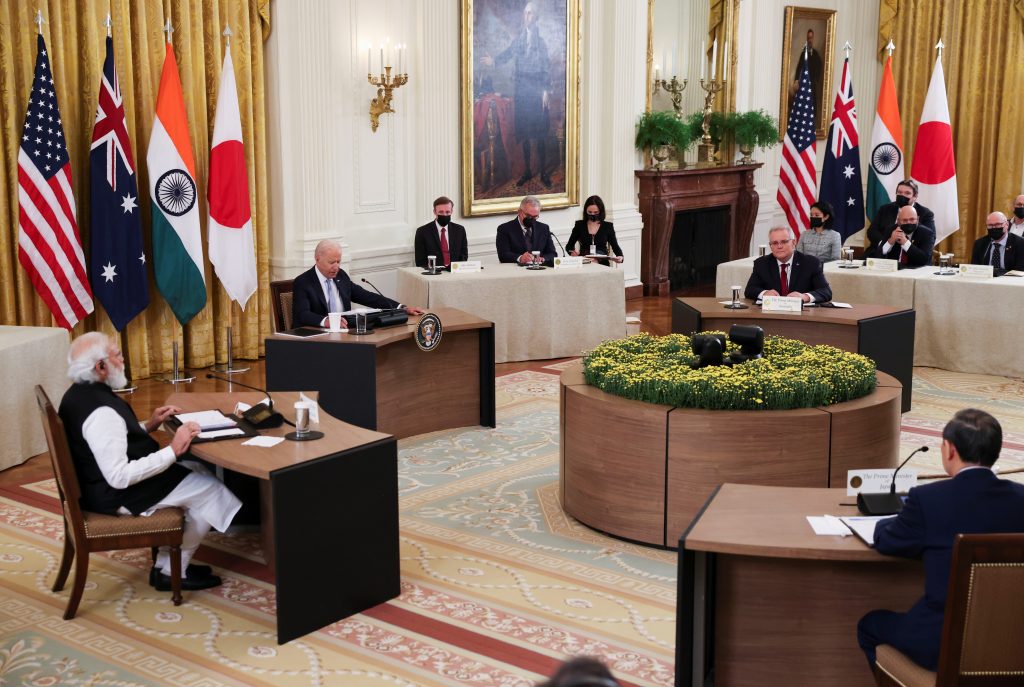The Quadrilateral Security Dialogue (Quad) was formed as a consultative dialogue forum between the United States (US), Japan, Australia, and India in 2007. The idea was to deal with the regional challenges of the Pacific region and enhance cooperation on common interests between member states. Despite its slow progress in the initial years, a few ministerial-level meetings were held to discuss common interests. The Trump administration, back in 2017, tried to resurrect the Quad after it remained inactive for nearly a decade, but that did not result in any major breakthrough. However, now under the Biden administration, Quad seems to be undergoing a gradual transformation from a consultative forum into a transnational security alliance that seeks to counter China’s increasing influence in the Asia-Pacific region.
The revival of Quad is significant for US foreign policy and projection of its supremacy in the Asia-Pacific region, particularly after the withdrawal of Western forces from Afghanistan. The US seems to be interested in maintaining its influence within the region without indulging in military interventionism to further secure its great power interests despite withdrawing from Kabul. In order to fulfil this agenda, Washington is fast evolving the Quad mechanism by building a regional alliance system, to ensure its supremacy. The Biden Administration is more interested in an accelerated Quad formation than the previous administration. In his first diplomatic address in February 2021, President Biden asserted that ‘America is back.’ This implies that the US seeks revival of diplomacy for accelerating its alliance formation to counter growing Chinese global influence and strategic outreach.
In March 2021, the first-ever summit of the Quad countries was virtually held. This was perhaps the first step towards the establishment of an institutional mechanism for Quad because this led to the formation of working groups to deal with COVID-19, climate change, and emerging technologies. The first in-person summit of the Quad leaders was subsequently held on 24 September 2021 in Washington. Its key outcomes were to enhance cooperation on COVID-19, infrastructure projects, climate challenges, critical and emerging technologies, cyber security, and outer space. In this regard, various initiatives like the establishment of new working groups, networks, and exchange programs were also agreed upon. This shows that the US is quite keen to provide an institutional framework for the Quad to counter China and promote its supremacy in the Pacific region, on the pretext of shared common interests across several domains.
In the same vein, various additional initiatives are also in line. For instance, the ‘Bring Back Better World (B3W) Partnership’ proposed by the US at the G-7 summit in June 2021, which many believe is an alternative by the US led G-7 countries to the Chinese Belt and Road Initiative. B3W proposes investments in infrastructure and socioeconomic development projects for the developing world in the coming years. Eventually, this could enable the US to counter the Chinese geo-economic influence at the global level.
Similarly, the recently announced security agreement to enhance maritime cooperation between the US, the UK, and Australia (AUKUS) is another example of how the US intends to counter China by sharing sensitive nuclear technology with its key strategic partners. This would likely raise concerns about the future of the non-proliferation regime since a Non-Proliferation Treaty (NPT) non-nuclear state would be getting sensitive nuclear technology from the US.
This shift away from military interventionism to strengthening its alliance systems was even more evident from Biden’s maiden speech at the UN General Assembly on 21 September 2021. Apart from sharing his vision of various other global issues, he emphasized that diplomacy would remain the premier US instrument of power while the use of force would be a last resort. This shows that contrary to previous administrations, the Biden administration prefers alliance-building over unilateral interventions.
To conclude, it has become quite apparent that the US is gradually shifting away from its traditional strategy based on hard power towards a more dynamic diplomatic posture to project its supremacy over the rest of the world and also counter China. This changing strategy is based on expanding its economic, political and diplomatic influence, especially in the Asia-Pacific. In this regard, the Quad would likely serve as a key regional alliance for the US.
Haris Bilal Malik is a researcher at the Centre for Aerospace & Security Studies (CASS), Islamabad, Pakistan. The article was first published in Eurasia Review. He can be reached at cass.thinkers@gmail.com
Image Source: Jain, Ash. 2021. “Why the Quad summit was a strategic success” Atlantic Council, 30 Sep. https://www.atlanticcouncil.org/blogs/new-atlanticist/why-the-quad-summit-was-a-strategic-success/




